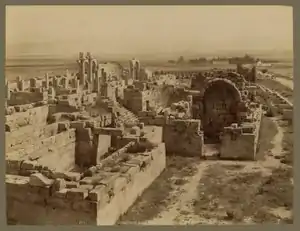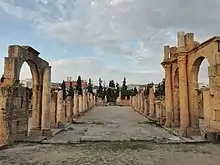Tebessa Basilica
The Tébessa Basilica is a Late Roman archeological site located in the eastern Algerian city of Theveste, which is known today as Tébessa. It is one of the largest remains of Roman basilicas in Northern Africa. It was dedicated to St. Crispina to honor her martyrdom in 305 CE.[1] This basilica was originally thought to have been created as a secular building for the Roman military; it developed into a religious building as new additions were built in the 4th and 5th century.[2][3][4]

History
The Numidian region where Theveste was found became a key part of Rome's development after the fall of the Byzantine city of Carthage.[5] Economic policies implemented in the Constitutional reforms of Julius Caesar created taxes on trade goods along Roman roads.[6]
When Roman legionary camp leader Legio III Augusta came to Theveste initially, he brought with him legionary forces and other travelers. His armies constructed roads throughout Northern Africa and established the first outposts for the Roman military in Theveste.[5][7] With these incoming Roman military families, Theveste grew and additional buildings were added to the structure that would become the basilica, which might have been used at that point for the collection of taxes on goods like olive oil and grain.[7][6]
We have less evidence for activity in the city of Theveste after the Romans left sometime before 98 C.E.[8] The roads that connected Carthage to Theveste and to Thamugade and Lambaesis had all been maintained and remained in good condition after other Roman roadways had suffered.[6][9]
In 295 C.E. a Christian man named Maximillian was martyred at Theveste for refusing to join military service.[10]
An inscription dated to 350 C.E. on the central niche mosaic of the basilica shrine is dedicated to Crispina, whose death took place in 305 C.E. Crispina's martyrdom would inspire pilgrimages to her shrine.[2][11] This is the point where the basilica begins to gain its religious connotation.
Due to the basilica's large size it was thought at this point to have served as a xenodochium in addition to providing other services such as baptisms and other church services.[12]
Design

The basilica's large size is due to the additions and modifications made by the various Roman and Byzantine leaders in the 4th and 5th century.[4][3] The mosaic floors are accented by a pathway of balustrades marking the entrance into the great forecourt of the basilica. Through the nave and aisles there is a large staircase containing 20 steps and measuring about 66 feet (20 m) wide.[13] A massive piscina is carved into the wall leading to a large open-air atrium. In the center of the atrium is a four-lobed fountain. At this four-way intersection, three archways remain standing in the hallways leading to the large nave and aisles of the main chapel. A pair of columns support the architrave where a gallery is located. A second altar footing can be found in the main chapel nave. The baptistery sits just down a staircase from the open-air atrium.[4][3] In the baptistery there is a relief carved into the floor beneath where the ceremonial font would have been placed. The scalloped design and nature of the room would also suggest that large marble table tops were used for offerings as well as alters.[14] Like other Roman Basilicas of the early Medieval era there is evidence of galleries that would have been used to display more mobile artwork.[2]
Additional buildings were added to the basilica complex between the 4th and 7th centuries, including a bathhouse, a garden, ground-floor stables and a martyrion.[15]
A smaller basilica was added to the complex in the 6th century.[15]
References
- "Страсти Святой Криспины" (PDF). periodical.pstgu.ru (in Russian). Retrieved 21 April 2023.
- Patout., Burns, J. (2014). Christianity in Roman Africa : the Development of Its Practices and Beliefs. Wm. B. Eerdmans Publishing Co. ISBN 9781467440370. OCLC 988867632.
{{cite book}}: CS1 maint: multiple names: authors list (link) - Schaff, David Schley Stevens (2005). Bay articulation in early Christian architecture. UMI Dissertation Services. OCLC 912841603.
- Glerup, Michael (2017). "Christianity in Roman Africa: The Development of its Practices and Beliefs by Jr. J. Patout Burns, and Robin M. Jensen". Journal of Early Christian Studies. 25 (1): 151–153. doi:10.1353/earl.2017.0006. ISSN 1086-3184. S2CID 171837661.
- Ancient Rome : from the earliest times down to 476 A. D. by Robert F. Pennell.
- van Sickle, C. E. (April 1930). "The Public Works of Africa in the Reign of Diocletian". Classical Philology. 25 (2): 173–179. doi:10.1086/361227. ISSN 0009-837X. S2CID 224795672.
- Bruce., Hitchner, Robert (1982). Studies in the history and archaeology of Sufetula and its territorium down to the Vandal conquest. OCLC 1035272140.
{{cite book}}: CS1 maint: multiple names: authors list (link) - Watkins, Thomas H. (2002). "Colonia Marciana Traiana Thamugadi: Dynasticism in Numidia". Phoenix. 56 (1/2): 84–108. doi:10.2307/1192471. ISSN 0031-8299. JSTOR 1192471.
- Monica., Hellstrom. Public Construction under Diocletian. A study of State Involvement in Construction in Roman Era Towns in Present Day Tunisia and Eastern Algeria. OCLC 1016475890.
- Marie., Yasin, Ann (2006). Commemorating the dead - constructing the community : church space funerary monuments and saint's cults in late antiquity. UMI. OCLC 718697903.
{{cite book}}: CS1 maint: multiple names: authors list (link) - Wilhite, David E. (2017-07-14). Ancient African Christianity. doi:10.4324/9780203075678. ISBN 9780203075678.
- Alan., Anderson, Mark (2012). Hospitals, hospices and shelters for the poor in late antiquity. OCLC 834997744.
{{cite book}}: CS1 maint: multiple names: authors list (link) - Ferguson, John (October 1966). "Roman Algeria". Greece and Rome. 13 (2): 169–187. doi:10.1017/s0017383500015503. ISSN 0017-3835. S2CID 165265980.
- Kitzinger, Ernst (1960). "A Marble Relief of the Theodosian Period". Dumbarton Oaks Papers. 14: 17–42. doi:10.2307/1291143. ISSN 0070-7546. JSTOR 1291143.
- Kenney, J. P.; Kazhdan, Alexander P.; Talbot, Alice-Mary; Cutler, Anthony; Gregory, Timothy E.; Sevcenko, Nancy P. (July 1993). "The Oxford Dictionary of Byzantium". Journal of the American Oriental Society. 113 (3): 509. doi:10.2307/605428. ISSN 0003-0279. JSTOR 605428.
Bibliography
- Anderson, M. A. (2012). Hospitals, hospices and shelters for the poor in late antiquity (Order No. 3525161).
- Burns, J. Patout, and Robin M. Jensen. Christianity in Roman Africa : The Development of Its Practices and Beliefs, Wm. B. Eerdmans Publishing Co., 2014. ProQuest Ebook Central,
- Eugene Rosenblum. (2017). Passion of St. Crispina. Vestnik Pravoslavnogo Svâto-Tihonovskogo Gumanitarnogo Universiteta: Seriâ II. Istoriâ, 77(77), 113-121.
- Ferguson, John. “Roman Algeria.” Greece & Rome, vol. 13, no. 2, 1966, pp. 169–187. JSTOR, JSTOR,
- Hellstrom, M. (2014). Public Construction under Diocletian. A study of State Involvement in Construction in Roman Era Towns in Present Day Tunisia and Eastern Algeria.
- HITCHNER, R. B. (1982). Studies In The History And Archaeology Of Sufetula And Its 'territorium' Down To The Vandal Conquest (Order No. 8215014). Available from ProQuest Dissertations & Theses Global. (303235863).
- Kazhdan, A., Talbot, Alice-Mary Maffry, Cutler, Anthony, Gregory, Timothy E, & Ševčenko, Nancy Patterson. (1991). The Oxford dictionary of Byzantium. New York: Oxford University Press.
- Kitzinger, Ernst. “A Marble Relief of the Theodosian Period.” Dumbarton Oaks Papers, vol. 14, 1960, pp. 17–42. JSTOR, JSTOR, www.jstor.org/stable/1291143.
- Pennell, R. (2005). History of rome from the earliest times. Whitefish, MT: Kessinger Pub.
- Schaff, D. (1974). BAY ARTICULATION IN EARLY CHRISTIAN ARCHITECTURE., ProQuest Dissertations and Theses.
- Sharp, W. (1895). ROME IN AFRICA. Harper's New Monthly Magazine, 91, 95.
- Van Sickle, C. (1930). The Public Works of Africa in the Reign of Diocletian. Classical Philology, 25(2), 173-179.
- Watkins, T. (2002). COLONIA MARCIANA TRAIANA THAMUGADI: DYNASTICISM IN NUMIDIA. Phoenix, 56(1/2), 84-108,212.
- Wilhite, David E. (2017-07-14). Ancient African Christianity: An Introduction to a Unique Context and Tradition. Taylor & Francis. ISBN 9781135121426.
- Yasin, A. M. (2002). Commemorating the dead - constructing the community: Church space, funerary monuments and saints' cults in late antiquity (Order No. 3048435).